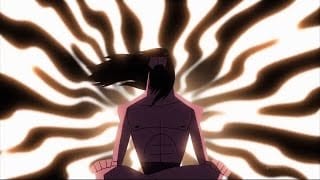The adventures of Samurai Jack and his new protege, Ashi, continue as they go in search of the samurai’s sword. This episode begins with an explanation of how he lost it.
The flashback to the event resembles the old series in a few ways. First, Jack is of course wearing his old clothes, and has no beard. Second, we’re treated to lingering shots of his ascent up the mountain, silently. A change of pace from the otherwise more dialogue-heavy season.
Along the way, he meets three small, cute mountain goats. They follow him up to the peak, where he finds a time portal, and jumps into it…only for Aku to yank him out. The Shogun of Sorrow laughs, and destroys the portal, proclaiming it to be the last one in the world. Jack now has no means of returning to the past.
The samurai responds with barely-constrained rage, as Aku taunts him. He lashes out with his sword, and Aku escapes. But not before twisting the friendly goats into monsters. They attack, and Jack kills them. In death, they turn back to their normal shape. This shocks Jack, and he stumbles, dropping the sword. It drops into the deep pit where the portal used to be.
This is the scene we’ve already seen in a flashback, but it doesn’t have the green glow and mist Jack’s memory did. It’s not as profound a moment as you’d expect. Also, it means Jack lost his sword at the very beginning of the fifty-year period between the seasons, and that Aku had somehow remained ignorant of it throughout.
Regardless, Ashi and Jack arrive at the mountain just as the flashback ends. They’re riding on another of the samurai’s animal friends, an owl, this time. The bird takes them down into the chasm. The sword isn’t there, however. Jack concludes that he didn’t lose it, it left him. He resolves to find it through a spiritual journey, via meditation. Ashi simply waits until a horde of orc-like soldiers appears to kill him. As Jack heads deeper into a metaphysical landscape, Ashi bars the way against the soldiers. She has a tense confrontation with their leaders, and an amusing situation arises. The soldiers in the back can’t hear anything, and are just confused why everyone stopped.

Meanwhile, Jack meditates into some sort of spirit world. He walks along rolling hills, and takes a boat over water. This eventually gives way to a cosmic setting, where he reaches a door. There, a mysterious, monk-like figure greets him, and invites him for tea.
What follows is a juxtaposition. Jack painstakingly makes tea, which is a shortened version of the traditional Japanese tea-making ceremony. Those shots are mingled with Ashi, as she single-handedly demolishes the orc army. Ashi looks violent and vengeful as she tears through them; she has none of Jack’s qualms about killing. She literally plows through the army as if she was pushing down a few dominoes. Gory imagery flashes as people are stabbed through by spears, cut, kicked, bruised, and maimed. It’s hard to say whether it’s meant to be humorous or dramatic. Eventually, the juxtaposition between the calm tea house and the roaring battle slides from humorous into the area of black comedy. The action is intense and very well animated, and the scene is probably worthy of a rewatch to understand it fully.
When Jack finally makes the tea, the monk proclaims it to be terrible. Jack couldn’t make good tea, because his spirit is in turmoil. And then, his inner voice comes out again. The vision of old Jack is red this time, and full of rage. He claims the monk has no right to make demands of them, after everything they’ve been through. He accuses him of spouting nonsense and withholding information.

But this time, Jack actively confronts his inner voice. He blames it for keeping the past hidden from him, losing the sword, and obstructing his mission. Its anger and frustration, he says, caused him to lose his way. The voice only grows angrier, and physically lashes out against Jack; but he only denies it further, and refuses to be consumed by it any longer.
The monk declares that now he is balanced, and Jack is placed before the same three gods who once forged his father’s blade. They say he’s the chosen one, and give him his sword back. They also transform his appearance back to its old form. Jack is well and truly back.
Unfortunately, it’s not very satisfying. After all the build-up to it, Jack’s confrontation with his inner turmoil and loss of his sword lacks the necessary weight. To start with, the loss itself felt more like a random event than a dramatic moment. He was furious at Aku, and regretted killing the goats, and that was enough for the sword to leave him? Maybe it was more about the loss of hope after Aku had destroyed all the portals to the past, but we see no indication of its being the case.
Particularly since the final resolution of the conflict, in the monk’s spiritual teahouse, is all about Jack’s inner anger. Which falls flat for a few reasons. First off, it feels incredibly unfair to Jack. Yes, he was angry, and frustrated. Who wouldn’t be? He had to fight an all-powerful incarnation of pure evil and continually faced legions of assassins and bounty hunters. He had to live with the knowledge that his parents died in despair, believing him dead. All around, he saw an empty and cruel future created by his failure to kill Aku, who taunted and emotionally tormented him with glee. The fact that he largely ignored his darker side’s urgings and didn’t act on them speaks of frankly superhuman restraint. And didn’t he already have this same sort of Arc all the way back in Mad Jack?
That it all boils down to a short confrontation where Jack denies his anger just doesn’t have much narrative gravity to it. Throughout the season, we saw Jack struggle and grapple with despair in a very believable and emotional manner. To have it all resolved by a simple refusal to be angry is a neat wrap-up that doesn’t do it justice. Perhaps it’s the fault of the season’s short time-frame.
While Jack gets over the anger issues he apparently had, Ashi has her final confrontation with her mother. Her mother is still out to kill Jack, and mercilessly taunts Ashi for failing her mission, her sisters, and Aku. There are several ways to handle a confrontation like this, as Ashi is now against her abuser and failed mother figure. Their confrontation is very well choreographed and a pleasure visually. Though it feels in some ways rushed. This is the culmination of Ashi’s arc, as her mother is one of the few remnants of her torturous past, and showcases her complete rejection of her original goal of killing Jack.

As such, it feels too fast. Ashi and her feelings should’ve been given more focus, instead of her battle with the orc-like beings. While her battle isn’t bad, it doesn’t feel as exciting as it should’ve been. More thought will be given to why it felt this way in a different post. Although her final blow to her mother was poetic and cathartic in its own way, so that’s good at least.
Here’s hoping that as Jack and Ashi move on to finally face down Aku and end it all, the season will do this final confrontation justice.

